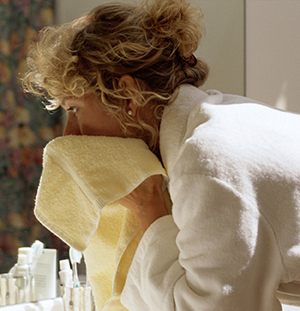Self-Care for Skin Rashes

What can cause a skin rash?
Sun poisoning, caused by too much exposure to the sun
An irritant or allergic reaction to a certain type of food, plant, or chemical, such as shellfish, poison ivy, and or cleaning products
An infection caused by a fungus (ringworm), virus (chickenpox), or bacteria (strep)
Bites or infestation caused by insects or pests, such as ticks, lice, or mites
Dry skin, which is often seen during the winter months and in older people
How can I control itching and skin damage?
Take soothing lukewarm baths in a colloidal oatmeal product. You can buy this at the drugstore.
Do your best not to scratch. Clip fingernails short, especially in young children, to reduce skin damage if scratching does occur.
Use moisturizing skin lotion instead of scratching your dry skin.
Use sunscreen whenever going out into direct sun.
Use only mild cleansing agents whenever possible.
Wash with mild, nonirritating soap and warm water.
Wear clothing that breathes, such as cotton shirts or canvas shoes.
If fluid is seeping from the rash, cover it loosely with clean gauze to absorb the discharge.
Many rashes are contagious. Prevent the rash from spreading to others by washing your hands often before or after touching others with any skin rash.
Use medicine
Antihistamines such as diphenhydramine can help control itching. But use with caution because they can make you drowsy.
Using over-the-counter hydrocortisone cream on small rashes may help reduce swelling and itching
Most over-the-counter antifungal medicines can treat athlete’s foot and many other fungal infections of the skin.
Check with your healthcare provider
Call your healthcare provider if:
You were told that you have a fungal infection on your skin to make sure you have the correct type of medicine.
You have questions or concerns about medicines or their side effects.
Call 911
Call 911 if either of these occur:
Your tongue or lips start to swell
You have difficulty breathing
Call your healthcare provider
Call your healthcare provider if any of these occur:
Temperature of more than 101.0°F (38.3°C), or as directed
Sore throat, a cough, or unusual fatigue
Red, oozy, or painful rash gets worse. These are signs of infection.
Rash covers your face, genitals, or most of your body
Crusty sores or red rings that begin to spread
You were exposed to someone who has a contagious rash, such as scabies or lice.
Red bull’s-eye rash with a white center (a sign of Lyme disease)
You were told that you have resistant bacteria (MRSA) on your skin.